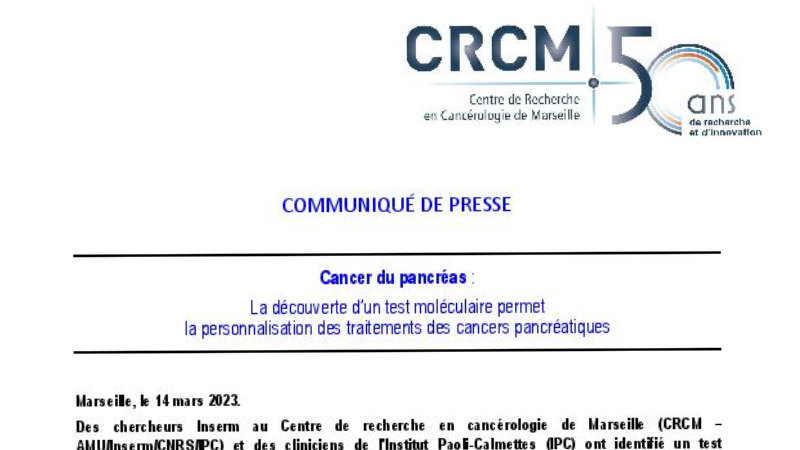
Inserm researchers at the Marseille Cancer Research Center (CRCM - AMU/Inserm/CNRS/IPC) and clinicians at the Paoli-Calmettes Institute (IPC) have identified a molecular test for personalized treatment of pancreatic cancer. This new strategy, based on the prediction of the sensitivity of each patient to the different chemotherapy protocols currently available, opens the way to personalized treatments for pancreatic cancer.
Pancreatic cancer, a complex disease
Pancreatic cancer is a particularly aggressive cancer, but the precise prognosis of the disease is difficult to establish, with newly diagnosed patients having a life expectancy that varies from 3 months to over 5 years. Only 15% of patients with pancreatic cancer are eligible for surgery, the only curative treatment available to date. Management is mainly focused on chemotherapy treatments. However, therapeutic decisions are made without any information about the molecular characteristics of the tumor material.
The advent of personalized medicine
The research program led by two Inserm researchers, Dr. Juan Iovanna and Dr. Nelson Dusetti, took as its starting point the fact that every tumor is different and that its molecular characteristics contain information that could help identify the most suitable chemotherapy.
In a study published in the prestigious journal Gastroenterology, the CRCM team shows how, using a molecular analysis of a very small amount of tumor cells from a biopsy taken at diagnosis, it is possible to determine the best treatment for each patient.
A clinical trial promoted by the IPC and a solution accessible to patients
This discovery was put to the test in a clinical trial promoted by the Paoli-Calmettes Institute and conducted in collaboration with the Centre Hospitalier Universitaire d'Angers and the Hôpital Civil des Hôpitaux Universitaires de Strasbourg. The prediction of the molecular test could be validated on biopsies of more than 100 patients, for whom resistance to chemotherapy was known. The clinical study validated the high predictive value of the molecular test.
This method of predicting response to treatment has been patented by SATT Sud-Est, on behalf of Inserm, CNRS, AMU and IPC (the four supervisory bodies of the CRCM) and the operating license has been transferred to PREDICTING MED, a start-up company based in Marseille, whose objective is to make it accessible to patients.
References
A transcriptomic-based tool to predict gemcitabine sensitivity in advanced pancreatic adenocarcinoma. N. Fraunhoffer, B. Chanez, C. Teyssedou, PDAC Chemo sensitivity prediction working group, J. L. Iovanna, E. Mitry, N. J. Dusetti. Gastroenterology. 2022 Dec 7;S0016-5085(22)01373-7. doi: 10.1053/j.gastro.2022.11.035.
About the Marseille Cancer Research Center (CRCM)
Created in 2008, the Marseille Cancer Research Center brings together the four major players in research in the PACA region: Inserm, Aix-Marseille University, the CNRS and the IPC.
With more than 400 collaborators divided into 19 teams, the CRCM implements innovative research programs in the field of cancer, from the most fundamental aspects to clinical research in humans. The priority scientific and medical activities are, on the one hand, the deciphering of the molecular basis of oncogenesis and tumor dissemination, and on the other hand, the discovery and implementation of therapeutic innovations in the treatment of breast cancer, pancreatic cancer and hematological malignancies.
For more information: https: //www.crcm-marseille.fr
About the IPC
Certified by the French National Authority for Health (HAS) in 2021 with a High Quality of Care rating, the highest level of certification, and accredited as a Comprehensive Cancer Center by the Organization of European Cancer Institutes (OECI) in June 2019, the Institut Paoli-Calmettes is a member of the Unicancer network. The IPC brings together 1,900 medical and non-medical staff involved in the comprehensive management of all cancer diseases: research, medical and support care, teaching and training. The IPC has performed more than 100,000 consultations and will welcome nearly 12,000 new patients in 2021. Treatment at the IPC is based exclusively on social security rates, and there are no additional fees. The IPC has established cooperative arrangements with some twenty health care institutions in the region.
For more information: www.institutpaolicalmettes.fr

